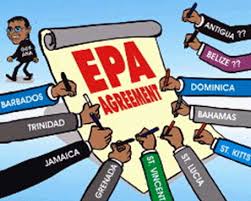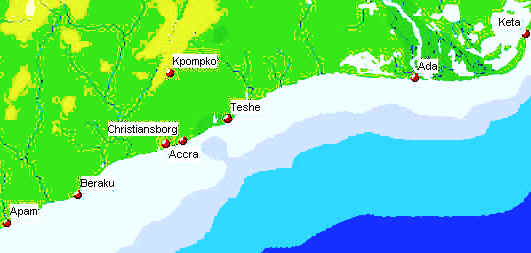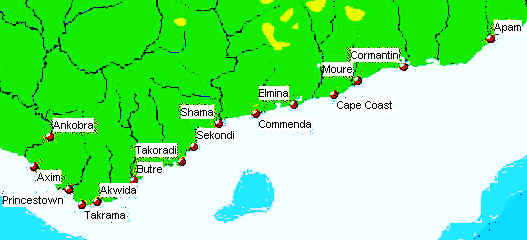…Certainly Not. Yes, ECOWAS had unveiled its long suspected marriage to the EPA. So we may argue it’s yet another ploy to re-colonization. But Think Again. When Nana Kwamena Ansah negotiated with the Portuguese traders on the building of a trading Post at Elmina; he contractually, did bind himself and his subjects but not for the Ga-Adangbe or the Ewes. He could yes; not have even done the same on behalf of his immediate cousins in Afutu or Half-Assini, unless he was powerful enough to have asserted that authority, either by conquest or negotiations
BRIEFS & MEMOS
Why the Debate Over EPAs? WE’RE BOUND BY OUR SIGNATURE. In L’Estrange v F. Graucob Ltd [1934] 2 KB 394, the claimant bought an automatic slot machine from the defendants. She signed an order from which contained a clause which excluded liability for express and implied warranties. When the claimant discovered that the machine did not work she brought an action against the defendants for breach of an implied warranty that the machine was fit for purpose for which it was sold. Judgement was given for the defendants on the grounds that they had excluded their liability by virtue of the exclusion clause which was incorporated into the contract by the claimant’s signature, even though the exclusion was ‘regrettably small print’ and had not been read by the claimant. Ewan Mckendrick (2003) writes that given the widespread use of contracts which rely heavily upon the use of small print, such a rule appears singularly unfortunate, especially in its application to consumers. The Ontario Court of Appeal in Tilden Rent-a-Car Co. v Clendennin (1978) 83 DLR (3d) 400 recognised that many standard form printed contracts are signed without being read or understood. The court accordingly, held that a signature could only be relied upon as evidence of genuine consent when it was reasonable for the party relying on the signed document to believe that the signer did assent to the onerous terms proposed [1].
INTRODUCTION
At the dawn of Gold Coast’s independence struggles, one of the silent accusations waged by the rising intelligentsias [in]directly at our forefathers, especially, those Fanti Chiefs who were signatories to the Fante Bond of 18844 [2], on their failures to comprehend or pay critical scrutiny at the consequences of the contents and the wording of the Bond, which on 06 March 1844, the contracting parties of the Fante Confederacy, probably, freely thumb-printed, to the satisfaction of Commander H.W. Hill- the then Governor of the Gold Coast, for and on behalf of the British Crown, in faraway the United Kingdom. It came as no surprise that some 100 years on, the contents and the interpretations given to this agreement erupted contentious debate upon which colonization was persistently resisted, agitated and defeated. Our reminder in 2014 is for the ruling intelligentsias to seek for a diligent bargain, terms and conditions in the emerging European Partnership Agreement (EPA) that promises the needs of the unborn generations.
COMMENTARY
In our article- “Tribute to Justice Cecilia Addow”, we commented that the L’Estrange rule on signature does not apply where a signature had been procured by fraud, misrepresentation or the defence of non est factum- (‘this is not my deed’), is made. Non est Factum is where an illiterate person signed a deed which had been read out to him incorrectly by another person. The effect here is to render the deed void so that a third party cannot obtain good title under it. We are advised that the rule had to grapple with two competing policies: Firstly, the injustice of holding a person to a bargain in which he has not brought a consenting mind and the necessity of holding a person to a document which he has signed, especially where innocent third parties rely to their detriment upon the validity of the signature. [1]
Thus legally, the Non est Factum defence is unavailability to the careless. In the United Dominions Trust Ltd. v. Western [1976] QB 153, the defendant signed a loan agreement with the claimant company in connection with the purchase of a car and left it to the garage owner to fill in the details, including the price. The garage owner inflated the price of the car and the claimant company paid over the money to the garage owner in good faith. It was held that the onus was on the defendant to show that, allowing the form to be filled in by the garage owner, he had acted carefully as he had wholly failed to discharge that onus and therefore could not invoke Non est Factum. The historical Bond of 1844 acknowledged the power and jurisdiction of the British Government over the Fante areas whose predate Gold Coast Chiefs- notably, heirs to Nana Kwamina Ansah, [in]advertently, affirmed British jurisdiction over criminal civil case and promised to ‘mould the customs of the country to the general principles of British law’. [2]

Elmina Castle
The colonization of Gold Coast took this legal angle [2]: (1) the passage of British Settlement Acts, 1843, enabled Orders in Council to be made providing for the establishment of laws, institutions and ordinances for peace, order and good governance of Her Majesty’s subjects and others; and (2) the Foreign Jurisdiction Act, 1843, which mandated the exercise of political powers acquired by agreement or usage territories which had not become part of the British dominion by cession or conquest. In 1844, an Order in Council was made in pursuance of the Foreign Jurisdiction Act and the British Settlement Act requiring “judicial authorities in the Gold Coast when exercising jurisdiction among the indigenous peoples to observe such local customs as were compatible with the principles of the law of England and in default of such customs to proceed in all things as nearly as may be in line with the laws of England.”
Although the 1850 Constitution for Forts and Settlements is deemed as a milestone in Gold Coast’s legal history as administratively; the forts and settlements of the Gold Coast ceased to rely on Sierra Leone and accordingly, were given its Governor, assisted by Legislative and Executive Council, the day EPA will be finally signed could also be equated to that of the Fante Bond of 1844, as for the first time in post-independence Gold Coast, Ghana shall, unconditionally, have 100% access to European markets while it allows some 70% to the European Union. In the words of European Commission, Economic EPAs are trade and development agreements negotiated between the EU and African, Caribbean and Pacific regions engaged in a regional economic integration process [3]. Historically, Ghana-European trading dates back to 1471, where the Portuguese first arrived in Gold Coast. They were hosted by Nana Kwamena Ansah of Edina and his elders who offered them a parcel of land at their fishing coast where under the leadership of Don Diego d’Azambuja and his 600 soldiers, built a trading post in 1482. [4]
So, Adigwe(1975)- the Nigerian writer and solicitor, might be right: “Long before its colonization by the British, the Gold Coast, [now Ghana] was a focal point of European commercial activities. From the 16th century to the dawn of the nineteenth century, the trade settlements of the Dutch, Danes and the Britons spread along the coast. The purchase by the British, of the Dutch and Danish trade settlements in the early part of nineteenth century paved the way for the eventual transformation of the territory into the British Colony. Although the extension of British authority over the coastal territories took place in 1821, it was the Fante Bond of 1844 which should be regarded as a milestone in the establishment of British authority in the Gold Coast Colony.” Ghana attained its political self-rule on 6 March 1957. [5]
Lt. Commander H.W. Hill reached an agreement with the Fanti Confederacy on 06 March 1844. The Bond acknowledged the power of and jurisdiction which had been defacto exercised in their territories adjacent to the British Forts and Settlements and declared that the first object of law are the protection of individuals and property and that human sacrifices, panyarring or the kidnapping of hostages of debt and other barbarous customs are abominations and contrary to law. The Chiefs of the Confederacy agreed that serious crimes should be tried by British judicial officers sitting with the chiefs moulding the customs of the community to the general principles of British law. [2] Panyarring was said to be the practice of seizing and holding persons until the repayment of debt or resolution of a dispute which became a common activity along the Atlantic coast of Africa in the 18th and 19th centuries.
According to Toby Green(2011), the term was derived from the Portuguese apanhar- meaning to “catch” or “seize”, and may also have been related to the term penhorar, to “pledge”. “Its use, along with caboceer – derived from the Portuguese cabeça, meaning “head” – showed how important the Portuguese role had been in procuring slaves and negotiating with African authorities. “Research has indeed shown how slaves in Atlantic West Africa were usually either seized in warfare, offered for ransom after a raid, or pledged as security for credit and then sold into the Atlantic trade if the credit was not repaid.” [6] New Times reports [7] that the Portuguese’s stay at Elmina was cut short by the Dutch who had fought and defeated them in 1637 with the help of locals. “The local residents had thought that by helping the Dutch, they would stop slave trade… [But] extended the dungeons and continued with slave trade. The Dutch stayed at the castle for 235 years, from 1637-1872, while the Portuguese occupied it for 155 years, from 1482-1637. The British used it for 85 years, between 1872 and 1957.”
This article seeks neither to evaluate the pros and cons of Trans-Atlantic Slave Trade nor the contractual efficacy upon which the foundations of the Bond of 1844 or protectorate/ colonial status was contracted. Suffice to mention in passing that once upon a time, some gallant anti-slavery abolitionists such as: William Lloyd Garrison, Frederick Douglass, Harriet Tubman and William Lloyd Still, in the United States, saw slave trade as evil and called for the end of the institution of slavery. [8] Today, the Elmina Castle- once an intended friendly trading post/castle has now turned out as one of the terrifying slave castles in the world, and is being preserved as one of the UNESCO heritage sites. In 1984, some local chiefs in Ghana issued a public apology to Africans in the Diaspora, regretting the complicity of their forefathers in slave trade. In 2001 there was an international conference on racism in South Africa, where African raised the issue of reparations and demanded an ‘apology’ for the slave trade, but European only stated that they ‘regret’ it. The US and its EU allies feared that an apology, an admission of guilt would certainly bring legal consequences and force the payment of reparations in some form [9].
Accordingly the final wording of the conference’s declaration on slavery was agreed as follows: “We acknowledge that slavery and slave trading, including the trans-Atlantic slave trade, were appalling tragedies in the history of humanity, not only because of their inherent barbarism, but also in terms of their magnitude, organised nature and especially their negation of the essence of victims.” It would be recalled that the US’ delegation led by the then Secretary of State- General Colin Powell (rtd) walked out of the conference before this declaration was agreed, over criticism of Israel. [9] Reparation movement which started in the 1990s Africa defines it to mean- making, amends, or compensating for damages. The feeling is that Africans and those in Diaspora had a legitimate claim for compensation for the exploitation suffered under slavery and colonialism. So in 1993, a conference on reparations in led to the Abuja [Nigeria] Declaration calling for national committees to be set up to campaign for reparations.
Opponents to EPAs argue both in private and public that like the Bond of 1844 which allegedly; corrupted the hearts and minds of the predate Gold Coast chief with schnapps, sugar, gunpowder in an exchange for gold and other natural resources for European and American markets, and gradually evaporated into man-hunt, seizure at gunpoint and eventual exportation and slavery, the EPA needs a closer scrutiny of the terms and conditions embedded in the 70-by-100% EU-Africa trade deal. Thus from the suspicions of the 21st century Ghanaian, the ongoing bargain could be interpreted as an overture (French ouverture; German Ouvertüre, Vorspiel; i.e. opening) in music- a term originally applied to the instrumental introduction to an opera. According to Blom [10], during the early Romantic era, composers such as Beethoven and Mendelssohn began to use the term overture to refer to independent, self-existing instrumental, programmatic works that presaged genres such as the symphonic poem.
“These were ‘at first undoubtedly intended to be played at the head of a programme’. In 19th-century opera the overture, Vorspiel, Einleitung, Introduction, or whatever else it may be called, is generally nothing more definite than that portion of the music which takes place before the curtain rises.”[ibid] But the argument had been that long before the arrival of the Europeans at the Coast of Gulf of Guinea, the practice of slavery was prominent within many African cultures and that even today, there exists all forms of slavery[and exploitations]. How, just, could one equate EPA to the Bond of 1844? Charles Taliaferro, Paul Draper and Philip L. Quinn, define reincarnation as religious or philosophical concept that the soul or spirit, after biological death, begins a new life in a new body. [11] “The EPAs will be broad agreements, helping first of all to build regional markets and diversify economies in the ACP regions before opening up trade. They will build increased, balanced and sustainable trade between the two regions. They will change our relationship from one that offers tariff preferences – an eroding lifeline – to one that builds lasting and more efficient regional and international markets for the ACP [?]” [12]
Yes, commenting on the Cariforum-European Commission Economic Partnership Agreement (CSME) Professor Norman Girvan observed that the EPA appears to have significant implications for national and regional development, for the region’s autonomy in policy-making and for its ability to fashion a CSME that responds to its own choices and priorities. “I believe that the issues that arise buttress the arguments for full public disclosure, public explanation and public discussion of the EPA.”[13] Public disclosure, states OECD, refers to the act of making information or data readily accessible and available to all interested individuals and institutions. Public disclosure may take include: verbal or written statements released to a public forum, to the news media, or to the general public; publication in an official bulletin, gazette, report, or stand-alone document; and information posted on a website [14]. But Africa’s problem is not only with quality and productivity capacity but also EU’s demanded checks on standards.
CONCLUSION
Having said, it might have been accepted that the threats facing Ghana or Africa as whole, is not re-colonization through trading overtures but rather our inabilities to enhance the very colonial legacies- ‘institutions and indesigns’ that we dearly uphold, to meet the 21st-century challenges and complexes that haunt the wellbeing of the vast majority of Africans. In law, for an agreement to be a legally binding contract, it must contain four vital elements: offer, acceptance, intention to create legal relations and consideration. Unlike in Nana Kwamena Ansah’s case, in democracy, it is expected that parliament still remained the most important and influential arm of government and would have the final say before the EPA agreement could be signed or certified. So EPA cannot be the Bond of 1844 reincarnated unless the Ghanaian MP, so intended.
Asante Fordjour authored this Commentary for The OmanbaPa Research Group
JusticeGhana
…………
References
Available On Request



